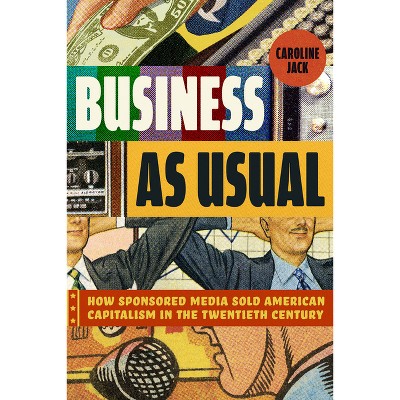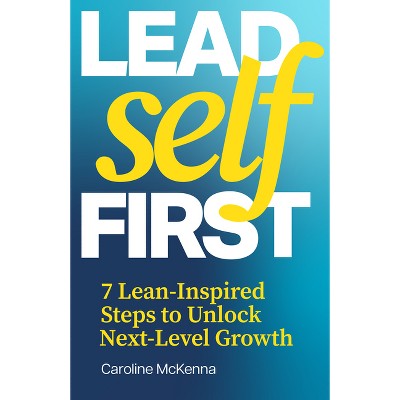Sponsored

Business as Usual - by Caroline Jack
$115.00
In Stock
Eligible for registries and wish lists
Sponsored
About this item
Highlights
- How corporations used mass media to teach Americans that capitalism was natural and patriotic, exposing the porous line between propaganda and public service.
- About the Author: Caroline Jack is assistant professor of communication at the University of California, San Diego.
- 264 Pages
- History, United States
Description
About the Book
"Caroline Jack reveals how specifically American capitalism has been created and made to seem inevitable through the propagation of its rhetoric and values in the most ephemeral of materials: public service announcements, pamphlets, educational films, and games-what she calls collectively "economic education media." These items, which found their ways into classrooms and onto the airwaves, promoted a distinctive conservatism under the cloaks of public service and civic education, linking and defining such protean terms as "the American way of life" and "free enterprise." This rhetoric remains dominant-a harbinger of the power of disinformation that so besets us today"--Book Synopsis
How corporations used mass media to teach Americans that capitalism was natural and patriotic, exposing the porous line between propaganda and public service. Business as Usual reveals how American capitalism has been promoted in the most ephemeral of materials: public service announcements, pamphlets, educational films, and games--what Caroline Jack calls "sponsored economic education media." These items, which were funded by corporations and trade groups who aimed to "sell America to Americans," found their way into communities, classrooms, and workplaces, and onto the airwaves, where they promoted ideals of "free enterprise" under the cloaks of public service and civic education. They offered an idealized vision of US industrial development as a source of patriotic optimism, framed business management imperatives as economic principles, and conflated the privileges granted to corporations by the law with foundational political rights held by individuals. This rhetoric remains dominant--a harbinger of the power of disinformation that so besets us today. Jack reveals the funding, production, and distribution that together entrenched a particular vision of corporate responsibility--and, in the process, shut out other hierarchies of value and common care.Review Quotes
"Explores sponsored economic education media across part of the twentieth century, promoting the argument that the ephemerality of sponsored economic education media has allowed it to largely escape serious examination as a coherent persuasive genre with its own distinctive ideas, logics, and styles."-- "Journal of Economic Literature"
"Faced with increased regulation, unionization, and other threats, business leaders launched a series of campaigns to 'sell America to Americans' beginning in the 1920s. . . . Richly researched, Business as Usual examines the hidden assumptions in this decades-long campaign and how it laid the foundations for neoliberalism and the triumph of market fundamentalism." -- "Choice"
"Business as Usual is anything but. This sharp-eyed media history lifts the lid on the twentieth-century fight to bend our imaginations to the will of capital. Think Duck and Cover for the C-suite set. You'll be surprised at every turn--by the stories and by the lessons they offer for our digital era."--Fred Turner, author of The Democratic Surround: Multimedia and American Liberalism from World War II to the Psychedelic Sixties
"Capitalism's greatest trick is convincing those under its dominion that there is no alternative. Jack's bold, persuasively argued account illustrates how twentieth-century corporate interests not only convinced Americans that capitalism is good, but that private enterprise is the essence of American liberty and patriotism. In Business as Usual, Jack shows how the American way of capitalism was naturalized by decades of pro-business advertising and civic education, and how this long-running ideological project continues to quell the economic imagination."--Josh Lauer, author of Creditworthy: A History of Consumer Surveillance and Financial Identity in America
"In this deftly written and richly illustrated book, Jack shows us in no uncertain terms how advertising became synonymous with America. In the guise of economic 'education, ' business boosters promoted free enterprise as central to the American way of life. Their efforts reached into homes, schools, and the government, creating an image of Americans as naturally inclined toward market capitalism. By aligning private enterprise with national identity, sponsored media carved a nation in its own interests. Business as Usual offers a deeply researched and theoretically robust account of how promotion has always been central to our national self-understanding."--Melissa Aronczyk, author of Branding the Nation: The Global Business of National Identity
About the Author
Caroline Jack is assistant professor of communication at the University of California, San Diego.Dimensions (Overall): 9.0 Inches (H) x 6.0 Inches (W) x .75 Inches (D)
Weight: 1.25 Pounds
Suggested Age: 22 Years and Up
Number of Pages: 264
Genre: History
Sub-Genre: United States
Publisher: University of Chicago Press
Theme: 20th Century
Format: Hardcover
Author: Caroline Jack
Language: English
Street Date: October 22, 2024
TCIN: 1006100943
UPC: 9780226835129
Item Number (DPCI): 247-50-1072
Origin: Made in the USA or Imported
If the item details aren’t accurate or complete, we want to know about it.
Shipping details
Estimated ship dimensions: 0.75 inches length x 6 inches width x 9 inches height
Estimated ship weight: 1.25 pounds
We regret that this item cannot be shipped to PO Boxes.
This item cannot be shipped to the following locations: American Samoa (see also separate entry under AS), Guam (see also separate entry under GU), Northern Mariana Islands, Puerto Rico (see also separate entry under PR), United States Minor Outlying Islands, Virgin Islands, U.S., APO/FPO
Return details
This item can be returned to any Target store or Target.com.
This item must be returned within 90 days of the date it was purchased in store, shipped, delivered by a Shipt shopper, or made ready for pickup.
See the return policy for complete information.













